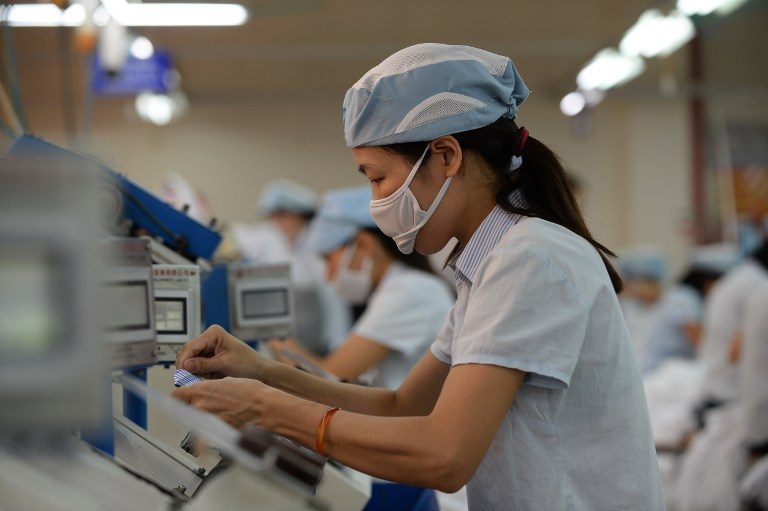SUMMARY
This is AI generated summarization, which may have errors. For context, always refer to the full article.

HANOI, Vietnam – After organising communist Vietnam’s first peaceful mass strike at a shoe factory, labor activist Do Thi Minh Hanh was arrested, beaten bloody by police, and jailed for 4 years.
Authoritarian Vietnam does not allow the millions of workers in its export-orientated factories, which are driving impressive economic growth, to form independent trade unions.
But this should change with the coming into force of the Trans-Pacific Partnership (TPP), a deal that has been touted as a foundation for “21st century trade” by US President Barack Obama.
The TPP seeks to liberalize commerce in some 40% of the global economy, and if ratified would oblige signatories – be they the US, Japan, Canada or Vietnam – to allow independent trade unions.
But activists like Hanh say the one-party state is a long way from concretely committing to that kind of change.
“Vietnam still wants to maintain its monopoly on trade unions,” said Hanh, who was released from prison in 2014 but lives under constant police surveillance.
Currently, all unions are part of the Vietnam Confederation of Labour, which is older than the ruling communist party.
Such official unions are “established to control workers, not to represent them,” activist Hoang Dung told Agence France-Presse.
The lack of meaningful representation is counterproductive as it leads to more wildcat strikes, said labour activist Nguyen Ngoc Nhu Quynh.
“Workers demonstrate as they cannot negotiate,” she said.
Quynh is not optimistic about the TPP as “who can ensure that the trade union is really independent and will listen to workers’ concerns?”
Company vs. worker rights
The TPP contains a controversial investor-state dispute settlement mechanism which allows companies to take governments to court if they feel their rights are violated.
But the deal has no equivalent enforcement mechanism to make sure member states live up to their commitments on labour or the environment.
Oxfam’s Andrew Wells-Dang notes that Vietnam has signed up for numerous rights and labour agreements in the past but failed to implement them.
The TPP “could contribute to opening up space on labour issues… but what happens if it doesn’t?” he said.
The risk is the deal will simply “replace one set of (local) state owned actors with another set of international corporate actors,” and do little to benefit workers or farmers.
Vietnam, whose low-wage economy relies heavily on exports, is projected to see the biggest percentage boost to the economy of any country in the TPP – about 10 percent by 2030, mostly thanks to textiles and apparel, according to World Bank figures.
Last year the economy grew at 6.68%, its fastest pace in five years, partially thanks to record foreign investment.
But in order to attract new high-quality TPP-linked investment, the communist country, which has the lowest GDP per capita and competitiveness ranking of the group, will have to introduce wide-ranging reforms.
“It requires a lot of effort for Vietnam to develop a full market system and define better the role of the state,” said economist Pham Chi Lan.
From brewing to baby formula, often inefficient state-run companies still have their fingers in every sector of the economy, and restructuring will be a long and painful process, she said.
But when the country signed on to the TPP it showed “they are serious about changing the system,” she said.
Geopolitical victory
Vietnam’s participation in the TPP reflects a “new consensus” among the country’s ruling elite about their foreign policy direction, said Jonathan London, a Vietnam expert at City University of Hong Kong.
The communist country wants to move close to the US and Japan, but is also eager not to antagonise its current largest trading partner Beijing, he said.
“Hanoi recognises the TPP for what it is: a once in a generation opportunity to bolster the country’s standings, economically and strategically,” he said.
The TPP will help Vietnam’s domestic reform by putting “structure and direction” into long-running efforts to overhaul the state sector, but while the pact offers tremendous opportunities to Vietnam, it is no magic bullet, said Virginia Foote of Bay Global Strategies.
“Companies look at the overall picture, if the only thing that is better is tariff levels, you might not move your factory or supply chain (there),” she said.
At the Garment Textile Corporation factory on the outskirts of Hanoi, the company has been planning eagerly for a post TPP era, said deputy director Than Duc Viet.
It has nearly doubled production capacity and is busy securing local supplies to take advantage of a provision which rewards member states for using yarn from other TPP countries.
The deals new labour standards are no concern, he added, as his company already invests heavily in perks to help retain skilled workers.
“With or without TPP, we will certainly be bankrupt if workers don’t want to stay,” he said. – Catherine Barton, AFP / Rappler.com
Add a comment
How does this make you feel?
There are no comments yet. Add your comment to start the conversation.